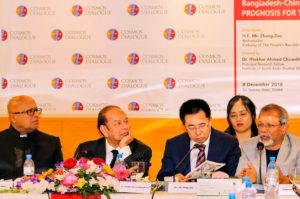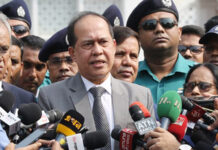Opposition Vows to Support China-backed Projects, If It Wins Bangladesh Polls

By Kamran Reza Chowdhury on Dec 19, 2018
In unveiling its electoral manifesto earlier this week, the National Unity Front (NUF) alliance indicated it would not freeze OBOR-related projects started under the government of Prime Minister Sheikh Hasina, whom the opposition bloc is trying to unseat in the polls.
“Bangladesh will join projects under China’s One Belt, One Road initiative, which will be beneficial for the country,” said Mahmudur Rahman Manna, one of the leaders of the NUF, as he read aloud the opposition manifesto during a news conference at a Dhaka hotel on Monday.
Separately, the ruling Awami League did not directly mention OBOR in its own electoral pledge, but promised to strengthen “friendly ties” and enhance “development cooperation” with China.
Bangladesh officially joined the OBOR initiative during Chinese President Xi Jinping’s visit to Dhaka in October 2016, when the two countries signed a memorandum of understanding for 27 projects with a total estimated cost of U.S. $22 billion.
OBOR is a trillion-dollar global investment plan by Beijing to build a vast network of ports, railways and roads in South and South Asia that would allow China to trade more easily with European countries via the Indian Ocean and Central Asia.
In Bangladesh, Beijing plans to spend U.S. $2.86 billion for a marine drive motorway and is contributing U.S. $753 million to a railway project, as well as U.S. $1.4 billion to the Dhaka airport.
The projects would make Bangladesh the second-biggest recipient of Chinese funds related to OBOR in South Asia, behind Pakistan, economic analysts say.
All parties ‘equally friendly’ to Beijing
Political parties in Bangladesh often have contrasting approaches to political issues while maintaining similar policies on economic development, Hossain Zillur Rahman, an economist and political commentator, told BenarNews.
“Everybody wants development, welfare,” he said. “All major political parties maintain equally friendly relations with Beijing.”
“The reason that the NUF mentioned in its election manifesto that it would implement OBOR projects is that the people want these projects implemented,” Rahman said. “It’s not important for them who is funding the projects.”
China maintains friendly relations with Bangladesh’s two biggest parties, he added, referring to Awami League and its traditional rival, the Bangladesh Nationalist Party (BNP), which has aligned itself with the newly formed NUF for the upcoming election.
“There is no political debate over Bangladesh’s warm relations with China. So there is scope to assume that Chinese influence in Bangladesh is on the rise.”
In unveiling its own electoral manifesto in Tuesday, the BNP said it would enhance connectivity with “other countries,” including India, Nepal, Bhutan, and the landlocked Chinese province of Yunnan, which borders Myanmar.
‘Very important development partner’
China has been implementing connectivity projects to link Yunnan with Bangladesh via Myanmar’s Rakhine state, foreign ministry officials said.
On an invitation from Beijing, a team of Awami officials, headed by party presidium member Faruk Khan, a retired colonel, visited China on a seven-day tour in October.
“China has been a very important development partner of Bangladesh,” Khan told BenarNews. “At our China tour, we had meetings with the high-ranking leaders of China’s Communist Party and the government to strengthen Bangladesh-China relations.”
Khan said the Awami League was also implementing connectivity projects with India and Myanmar.
“At our meetings with the Chinese leaders, we assured them that the development projects the Awami League government adopted under OBOR would be implemented,” Reazul Kabir Kawser, one of the Awami League leaders who visited China with Khan, told BenarNews.
As part of Jinping’s visit two years ago, China promised $24 billion in economic assistance to Bangladesh, mostly as lines of credit for two dozen projects.
In recent years, China has grown into Dhaka’s biggest trading partner, exporting about U.S. $16 billion worth of goods to Bangladesh, according to official figures.









